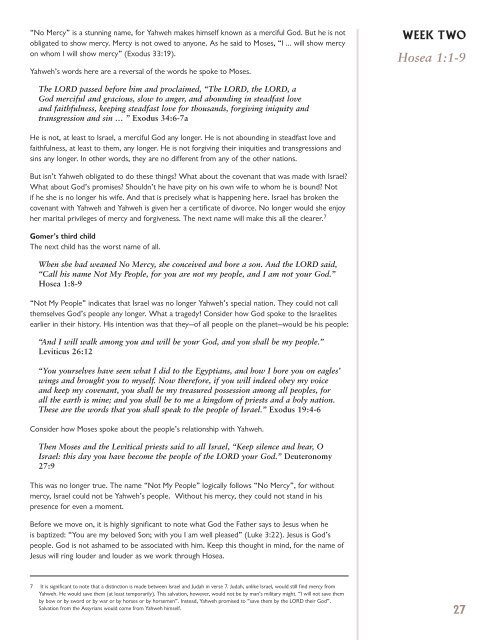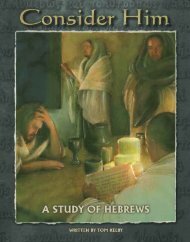Create successful ePaper yourself
Turn your PDF publications into a flip-book with our unique Google optimized e-Paper software.
“No Mercy” is a stunning name, for Yahweh makes himself known as a merciful God. But he is not<br />
obligated <strong>to</strong> show mercy. Mercy is not owed <strong>to</strong> anyone. As he said <strong>to</strong> Moses, “I ... will show mercy<br />
on whom I will show mercy” (Exodus 33:19).<br />
Yahweh’s words here are a reversal of <strong>the</strong> words he spoke <strong>to</strong> Moses.<br />
The LORD passed before him and proclaimed, “The LORD, <strong>the</strong> LORD, a<br />
God merciful and gracious, slow <strong>to</strong> anger, and abounding in steadfast love<br />
and faithfulness, keeping steadfast love for thousands, forgiving iniquity and<br />
transgression and sin … ” Exodus 34:6-7a<br />
He is not, at least <strong>to</strong> Israel, a merciful God any longer. He is not abounding in steadfast love and<br />
faithfulness, at least <strong>to</strong> <strong>the</strong>m, any longer. He is not forgiving <strong>the</strong>ir iniquities and transgressions and<br />
sins any longer. In o<strong>the</strong>r words, <strong>the</strong>y are no different from any of <strong>the</strong> o<strong>the</strong>r nations.<br />
But isn’t Yahweh obligated <strong>to</strong> do <strong>the</strong>se things? What about <strong>the</strong> covenant that was made with Israel?<br />
What about God’s promises? Shouldn’t he have pity on his own wife <strong>to</strong> whom he is bound? Not<br />
if he she is no longer his wife. And that is precisely what is happening here. Israel has broken <strong>the</strong><br />
covenant with Yahweh and Yahweh is given her a certificate of divorce. No longer would she enjoy<br />
her marital privileges of mercy and forgiveness. The next name will make this all <strong>the</strong> clearer. 7<br />
Gomer’s third child<br />
The next child has <strong>the</strong> worst name of all.<br />
When she had weaned No Mercy, she conceived and bore a son. And <strong>the</strong> LORD said,<br />
“Call his name Not My People, for you are not my people, and I am not your God.”<br />
Hosea 1:8-9<br />
“Not My People” indicates that Israel was no longer Yahweh’s special nation. They could not call<br />
<strong>the</strong>mselves God’s people any longer. What a tragedy! Consider how God spoke <strong>to</strong> <strong>the</strong> Israelites<br />
earlier in <strong>the</strong>ir his<strong>to</strong>ry. His intention was that <strong>the</strong>y—of all people on <strong>the</strong> planet—would be his people:<br />
“And I will walk among you and will be your God, and you shall be my people.”<br />
Leviticus 26:12<br />
“You yourselves have seen what I did <strong>to</strong> <strong>the</strong> Egyptians, and how I bore you on eagles’<br />
wings and brought you <strong>to</strong> myself. Now <strong>the</strong>refore, if you will indeed obey my voice<br />
and keep my covenant, you shall be my treasured possession among all peoples, for<br />
all <strong>the</strong> earth is mine; and you shall be <strong>to</strong> me a kingdom of priests and a holy nation.<br />
These are <strong>the</strong> words that you shall speak <strong>to</strong> <strong>the</strong> people of Israel.” Exodus 19:4-6<br />
Consider how Moses spoke about <strong>the</strong> people’s relationship with Yahweh.<br />
Then Moses and <strong>the</strong> Levitical priests said <strong>to</strong> all Israel, “Keep silence and hear, O<br />
Israel: this day you have become <strong>the</strong> people of <strong>the</strong> LORD your God.” Deuteronomy<br />
27:9<br />
<strong>This</strong> was no longer true. The name “Not My People” logically follows “No Mercy”, for without<br />
mercy, Israel could not be Yahweh’s people. Without his mercy, <strong>the</strong>y could not stand in his<br />
presence for even a moment.<br />
Before we move on, it is highly significant <strong>to</strong> note what God <strong>the</strong> Fa<strong>the</strong>r says <strong>to</strong> Jesus when he<br />
is baptized: “You are my beloved Son; with you I am well pleased” (Luke 3:22). Jesus is God’s<br />
people. God is not ashamed <strong>to</strong> be associated with him. Keep this thought in mind, for <strong>the</strong> name of<br />
Jesus will ring louder and louder as we work through Hosea.<br />
7 It is significant <strong>to</strong> note that a distinction is made between Israel and Judah in verse 7. Judah, unlike Israel, would still find mercy from<br />
Yahweh. He would save <strong>the</strong>m (at least temporarily). <strong>This</strong> salvation, however, would not be by man’s military might. “I will not save <strong>the</strong>m<br />
by bow or by sword or by war or by horses or by horsemen”. Instead, Yahweh promised <strong>to</strong> “save <strong>the</strong>m by <strong>the</strong> LORD <strong>the</strong>ir God”.<br />
Salvation from <strong>the</strong> Assyrians would come from Yahweh himself.<br />
WeeK two<br />
Hosea 1:1-9<br />
27



